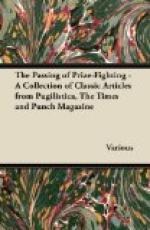Mr. HENRY ARTHUR JONES said that if any branch of art could effect social transformations it was the drama. Personally he looked upon the stage as only one degree less powerful than the Senate and vastly more serious than the Church. Its first duty was to instruct, elevate and reform; to amuse was never its true function. Hence, if the dramatists of the country cared to take up the task of remedying the servant shortage, the matter would be quickly settled. But only, added the speaker with extreme gravity, if the authors of the pernicious rubbish known as revue were first gagged and bound.
Mr. MAX PEMBERTON said that, although he had given up revue writing in favour of transforming farcical plays, he felt that he might make an appeal to the authors of revue (who often exceeded the audience in number) to join in this very laudable campaign. Speaking as one of the two-and-twenty Hippodromios, although no longer in that capacity, he would appeal to his successors to paint life below stairs in such resplendent hues that the desire instantly to take service would be implanted in every female bosom.
Mr. ALFRED SUTRO, speaking at the moment not so much as a dramatist as a man without a cook, said that he agreed heartily with the sentiments of the gentleman who had just sat down.
Sir ARTHUR WING PINERO said that he was always willing to help worthy causes and was as ready to write a play for the object in view as, not long since, he had been to write one to encourage economy. But it was useless unless the company chosen would co-operate. The dramatist did not stand alone. So long as the ordinary stage idea of a parlourmaid was a saucy nymph with a feather brush and very short skirts, so long would dramatists strive in vain to exalt her calling. He was prepared to do his best, but feared that the actors’ traditions would prove too strong.
Mr. WALTER MELVILLE said that he hoped nothing would be done to tamper with such traditions as Sir ARTHUR complained of. It was the duty of a stage servant to begin plays and to be funny. The curtain of a farce should rise on a butler and a parlourmaid remarking on the fact that master was suspiciously late last night; and the butler should be amorous, bibulous and peculative, and the parlourmaid coy and trim. Similarly, footmen should be haughty and drop their aitches, cooks short-tempered, red and fat, and office-boys knowing and cheeky. The public expected it, and the public ought to have it because the public paid.
There being no further remarks, the meeting dispersed, the various speakers returning sadly home to perform the household duties.
* * * * *
“EX-KAISER TO PAP THE PENALTY.”
Sunday Paper.
We always feared he would get off with a soft punishment.
* * * * *
[Illustration:_Docker_ (by way of concluding a heated argument with Scotsman). “WELL, GO UP THERE, THEN, AN’ TALK TO YOUR BLINKIN’ SCOTCH PALS.”]




